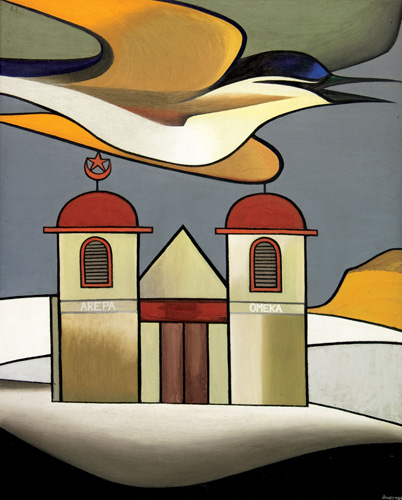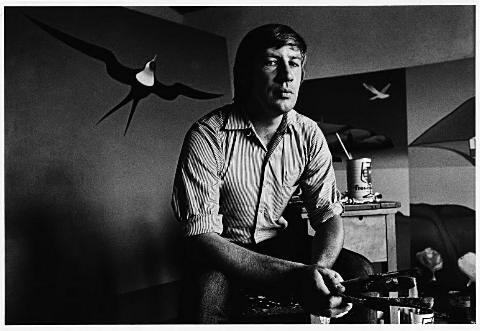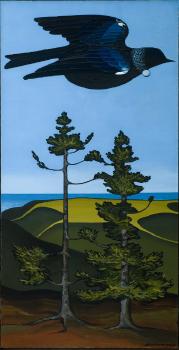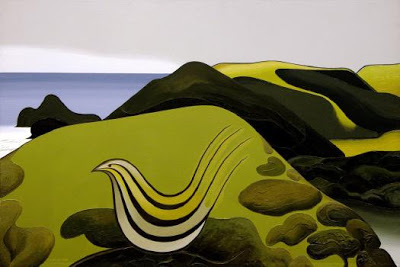Monday 17 September 2012
Ron Brownson

Don Binney, Kotare Over Ratana Church, Te Kao, 1963
oil on board, courtesy of a private collection, New Zealand
After Milly Paris spoke yesterday at Art + Object about her life-long committment to New Zealand's artists, she invited everyone present to stand and remember the life of Don Binney. It was a quellingly silent and sad moment, everyone understood that Don has created so many paintings that cherish life.
Don would have understood Milly's spontaneous gesture of affection for him as an artist. It signalled what Auckland and Aotearoa New Zealand shares in the losing of an exceptional citizen. Certainly, we are now mourning one of our most humane and concerned artists.

Marti Friedlander, Don Binney 1965
gelatin silver print, toned with gold, Auckland Art Gallery Toi o Tāmaki, gift of Marti Friedlander, with assistance from the Elise Mourant Bequest, 2001
Milly, and her late husband Les, were 'early adopters' of Don's remarkable art. He spoke about this in 1989 while looking back to that crucial period between 1965 and 1975 when his exhibitions would sell to people who concurred with the innovative ecology expressed by his artwork. His vision for New Zealand's fauna and flora was shared by a supportive coterie, they believed in what he was showing us. He noted that 'one's creativity was reinforced by an inquiring, literate and relatively homogeneous art scene. As often as not, a painting would be bought by another teacher, artist or writer as a gesture of support...'
Witness the outpouring of feeling that occurred when Dick Scott gifted Don's painting Kotare over Ratana Church, Te Kao to Christchurch's earthquake appeal in order to raise much needed funds. This was a gesture of support that Don himself applauded. That wonderful painting has been famous from the moment it was first exhibited. Dick had first seen it at Auckland's Ikon Gallery, acquiring it in October 1964. It was then shown in the important exhibition Contemporary New Zealand Painting at London's Commonwealth Institute and then, on its return, in Ten Years of New Zealand Painting in Auckland (1967) at this Gallery. This was the moment when Don became a renowned contemporary New Zealand artist. He was one of the first living artists to become well-known.

Don Binney, Tui over kauri, Te Henga, 1966
oil and acrylic on board, Auckland Art Gallery Toi o Tāmaki, gift of the Ministry of Foreign Affairs and Trade, Wellington, 2003
Don Binney thought a lot about what his art meant to others. He took his vocation as a painter seriously and he spoke about it with a voice replete with erudition and hard-won experience. His vocabulary in one-to-one conversation was no less impressive than when he was speaking to any spell-bound group. He savoured words like accents of local colour and never cared if his choice of words was considered arcane. Don laughed when I said autochthonous while in conversation with him. He rejoindered 'Ah Ron, you have read Ruth Ross's great essay on our New Zealand soil!'
Don was a seriously impressive speaker about the necessity of art. He noted once that 'the act of painting is a concrete expression of a continuing personal dialogue with my environment . . . Any good drawing or painting is to my mind an external gesture towards, or celebration of, those truths upon which we focus to sustain and extend our spiritual priorities'. He was a truly committed painter and one that we cannot forget.
I studied the Kotare over Ratana Church, Te Kao closely again last week. Isn't it one of the key New Zealand paintings of the 1960s? It has become again an icon of New Zealand's 1960s painting. Along with Rita Angus's Fog, Hawkes Bay, Gordon Walters's Painting No 1 and Colin McCahon's Here I Give Thanks to Mondrian?.
Don Binney himself enjoyed asking such quirky questions of about our art's history and how we regard it. There was, in recent years, the realisation that maybe the art community did not give him as much affirmation as they could have. This could be said about other artists of his generation also.
In 1971, Don contributed to the important Earth/Earth exhibition at the Barry Lett Gallery. The text that he prepared on that occasion is one of the most important of his published statements. It repays a close reading as the original catalogue is rarely encountered.
Don is survived by his wife, Phillipa and daughter Mary. To all of Don's family, the staff of Auckland Art Gallery Toi o Tāmaki extend our heartfelt aroha.
Moe mai i to moenga roa.

Don Binney, Sun shall not burn Thee by day nor moon by night 1966
oil and acrylic on canvas
Auckland Art Gallery Toi o Tāmaki, purchased 1966